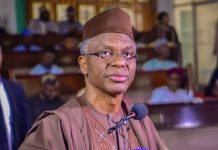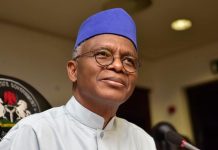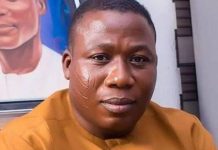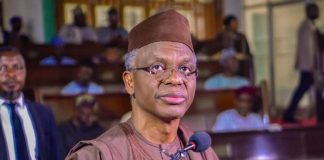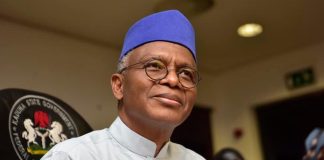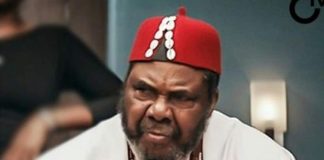🌿 Ruzu Non-Alcoholic Herbal Bitters
Ruzu Non-Alcoholic Herbal Bitters is a natural health supplement specially formulated to:
- ✅ Promote general wellness
- ✅ Detoxify the body
- ✅ Support the treatment of various ailments
Made from a powerful blend of 100% organic and medicinal herbs, Ruzu is completely alcohol-free, making it ideal for:
- 👪 All age groups
- 🌱 Health-conscious individuals
- 🌿 Anyone seeking non-alcoholic herbal remedies
Whether you're looking to boost your vitality, cleanse your system, or support healing the natural way, Ruzu Bitters offers a trusted herbal solution.
A former federal commissioner for information, Edwin Clark, last week demanded the implementation of the 2014 national conference report.
The same week, a former National Vice Chairman of the All Progressives Congress (APC), North-West, Salihu Lukman, resigned from the party.
These and three other stories we tracked dominated public discourse in the country.
1. Clark demands implementation of 2024 Confab report
On June 13, the leader of the Pan Niger Delta Forum (PANDEF) demanded the implementation of the national conference report midwifed by former President Goodluck Jonathan in 2014.
In a letter addressed to President Bola Tinubu, the elder statesman also called for a political solution to the travails of the leader of the Indigenous People of Biafra (IPOB), Nnamdi Kanu, who is standing trial for alleged treason and terrorism at the Federal High Court, Abuja.
He wrote: “Now that the elections are over, we must face the restructuring of this country.
“I repeat, the immediate restructuring of Nigeria must be carried out if this country is to remain one, and I appeal to Mr. President to take immediate action to implement the historic 2014 National Conference Report which submitted 600 recommendations to the Presidency on how to restructure Nigeria in every aspect of our lives.”
Why it matters
The elder statesman’s demand for immediate restructuring of Nigeria aligns with the majority’s opinion on the need to free the country from the problems besetting it.
With Nigeria seemingly in a state of anarchy, Clark’s remark on this is a reminder of the need to have an honest conversation between and among the country’s various entities to find a lasting solution to the problems threatening its corporate existence.
Such conversation among stakeholders in the Nigerian state will not only redefine the workings of the perceived faulty structures that have been largely identified as the major cause of agitations in the country but also set the template for the effective operation of the system for the good of all.
2. Salihu finally resigns from APC
A former National Vice Chairman of the All Progressives Congress (APC), North-West, Salihu Lukman, on June 12 resigned from the party.
Lukman, who confirmed his resignation in a statement in Abuja, said he took the decision due to the lack of internal democracy in APC.
The statement read: “Given all this, it is possible to remain in APC if at all President Tinubu will allow internal reform in the party to return it to its founding vision, which as it is, is very remote.
“But my reality now in the party is that my membership has been rendered useless and I do not need to continue to impose myself.
“I have therefore gone back to the trenches and will try to work with all committed Nigerians who agree and subscribe to the goal of actively campaigning for the survival and development of democracy in Nigeria.”
Why it matters
Lukman’s resignation from APC was the climax of the love-hate relationship between the two parties in the last few months.
The development lends credence that all is not well within the ruling party despite its electoral success and public posturing of the national leadership.
With the misgivings in the APC growing by the day, it is undebatable if the President’s decision to anoint Abdullahi Ganduje as chairman has not further diminished the party’s claim on internal democracy and thrown a spanner in the good works of yesteryears.
3. Ex-Edo commissioner dumps PDP
A former commissioner for Information in Edo State, Mr. Charles Idahosa, on June 11 explained why he dumped the Peoples Democratic Party (PDP) for the All Progressives Congress (APC) in the state.
He also resigned his membership of the party’s Board of Trustees.
In a chat with journalists in Benin City, the former commissioner said Governor Godwin Obaseki’s disregard for leaders in the party forced him out of the fold.
He said: “I stood up against former governor Adams Oshomhole who was then the APC national chairman. I had worked with him in various capacities before the 2016 governorship election.
READ ALSO:QuickRead: Atiku eyes presidency in 2027. Four other stories we tracked and why they matter
“So, because I saw that Obaseki was being victimised, my supporters and I decided to move with him to the PDP where he eventually secured the ticket and returned as the governor for the second time.”
Why it matters
Idahosa’s statement shows that the PDP in Edo State is in disarray heading to the September election.
The ex-commissioner only stopped short of saying Governor Obaseki has turned the PDP into his estate and this problem if not nipped in the bud could hurt the party when the Edo people go to the ballot to elect his successor in three months.
4. Reps propose rotational presidency, a six-year term
At least 35 members of the House of Representatives on June 10 proposed a bill seeking a series of amendments to the constitution.
The proposed changes include a rotational presidency among the six geopolitical zones, a single six-year term for presidents and governors, and the creation of two vice presidential positions.
The bill’s lead sponsor, Ikenga Ugochinyere, argued that a rotational presidency would foster a sense of national unity and reduce tensions by ensuring equitable representation for all regions.
He said: “The bill is also seeking a reduction in government spending and wastage, efficiency in governance, and national stability by providing a single term of six years for the President and Governors.”
Why it matters
The lawmakers’ move again suggests that Nigeria’s situation has assumed a national emergency that requires all manner of solutions to heal the wounds occasioned by bad governance and put the country back on track.
While the six-year single term may sound good, adopting the rotational presidency will amount to doing things the same way and expecting a different outcome.
The rotational presidency imposed on Nigeria as a compromise arrangement by the military dictators in 1999 has not served the country well and was largely responsible for the poor quality of leaders that have presided over the country’s affairs since the return of self-rule 25 years ago.
5. Bandits kill 20 in Katsina villages
Gunmen suspected to be bandits on June 9 killed about 20 people in the Gidan Bofa and Dan Nakwabo communities of Kankara local government area of the state.
President Bola Tinubu had since ordered security agents to fish out the killers
In a statement issued by his Special Adviser on Media and Publicity, Ajuri Ngelale, the president described the latest attacks as grisly and sinister.
The statement read: “President Tinubu directs security agencies to go after the assailants and ensure that they are brought to justice.
“The President condoles with the families of the deceased, as well as the Government and people of Katsina State, and prays for the repose of the souls of the departed.”
Why it matters
The almost daily attacks on communities and other soft targets have left Nigerians perplexed about their safety.
The unfortunate development again indicates the collapse of the country’s security architecture and an urgent reboot of the system for effective performance.
The problem requires proactive measures on the part of the government to halt the country’s slide into a failed state.
The post QuickRead: Clark demands implementation of 2024 confab report. Four other stories we tracked and why they matter appeared first on Latest Nigeria News | Top Stories from Naomisophyblog.

